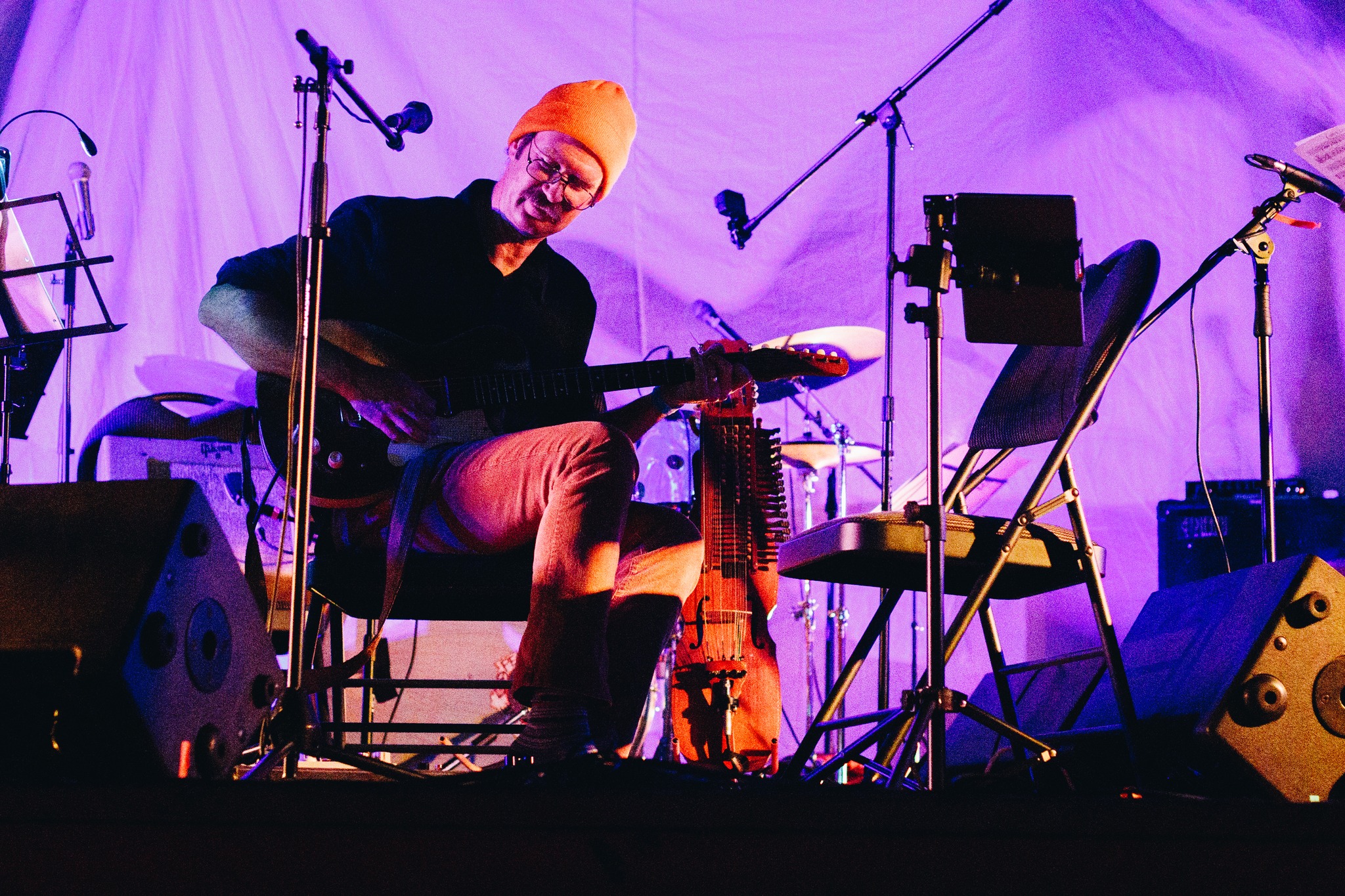Purveyors of: indie rock, instrumental, beautifully textured soundscapes
File next to: Do Make Say Think, Broken Social Scene.
Playing: Wavelength Winter Festival, March 2nd, 2024 @ St. Anne’s Parish Hall (651 Dufferin St.). More info here.
Charles Spearin is a Canadian musician and a founding member of the Toronto-based music collective Broken Social Scene. One notable project of his is his solo album, The Happiness Project, released in 2009. The album explores the musicality of everyday speech patterns, featuring interviews with Spearin’s neighbours discussing the concept of happiness.
Wavelength caught up with Charles to chat about his performance with Do Make Say Think at last year’s Wavelength Winter Festival (2023), songs that are special to him, and what he has planned for this year’s Wavelength Winter Festival (2024)
*Editor’s note: this interview has been edited for clarity
TW: Mentions of suicide
Wavelength: Last time you performed at the Winter Festival, you were a part of Do Make Say Think and this year, you’re performing as a solo performer. Is it any different for you when it comes to performing in a group versus performing solo?
Charles: It is different, yes. With both my bands (Broken Social Scene and Do Make Say Think), there is a well established framework to the shows. We mostly play songs from our albums with an occasional new idea or two thrown in to keep it fresh. When I’m given the opportunity to play as myself, I kind of go back to my roots – like I’m starting a new band and can follow whatever thread of an idea seems the most interesting. I do have a couple of solo albums I can draw from but I don’t feel much obligation to ‘play the hits’ as it were. Especially in Toronto and especially at Wavelength. Toronto is very much my home and Wavelength audiences are wonderfully open-minded and supportive of new ideas. And because there are so many brilliant artists in this city, I feel encouraged to push my creativity as far as I can, to join in the fun of expanding the boundaries of art and all that. But in my own way.
Wavelength: Speaking of last year’s performance, before one of the songs started, a man yelled out “You saved me from suicide!”. How does it feel to have such an impact on your fans’ lives?
Charles: Yeah, that was heavy. Although I have never quite stood on that edge myself, I do understand the convalescent quality of music and often rely on the musicians and bands of the city to bring me back from dark places.
If I stay home, my state of mind is likely to stay the same; if I go out, anything is possible. It’s a common thing to say “go out and support live music,“ but perhaps it should be rephrased as “go out and be supported by live music.” There is art out there, there is community out there, there is a three-dimensional, stereophonic world that wants to see you. Musicians don’t want your money (I mean, yes, they do, but) they want your attention because they have something to give you that can’t be delivered without it. Music isn’t instruments or vibrating air particles, music is noticing and listening. Music is a creature of flickering awareness and attention. Music is a ruby-crowned kinglet jumping from branch to branch in the sunlight. Music reminds us we are alive.
Most musicians make music because it brings them joy and they sincerely want you to feel that joy too. And when it works there is gratitude all round. And I think now it’s more important than ever.
Wavelength: Are you able to tell us a bit about what you have planned for the Winter Festival?
Charles: Hmmm. All I can say is that I’m trying something new. Because it’s Wavelength, and because it’s a fairly short set time, I’m following a couple of strange whims that I’m hoping will be very very cool. But then again, they might not. ¯\_(ツ)_/¯
The great thing about music is if it’s good it can be incredible but if it’s bad it’s harmless.
I make no promises.
I trust.
Wavelength: You are a multi-instrumentalist. Could you tell us what instruments you play and what inspired you to play those instruments?
Charles: I’m not very good at any of them though! [Charles gazes out the window for a long time] Hey! there’s a red-breasted nuthatch in that plum tree! [he quickly grabs his binoculars] It’s astonishing that a bird smaller than a clementine can survive a Canadian winter, isn’t it? [Charles opens the window, turns into a nuthatch himself and flys away leaving a pile of rumpled clothing on the floor and the curtains billowing in the cold wind]
Wavelength: [also turns into a nuthatch and follows Charles into the plum tree to continue the conversation] You have been creating music since the ‘90s. Out of all of your songs, what is your favourite and why?
Charles: [in bird language] “Favourite” is a challenging word but there are certain songs that are very special to me in that they represent a kind of discovery. An example of that might be “The Fare To Get There,” the last song on Do Make Say Think’s eponymous, first album. That song, to me, represents an abandonment of old, cumbersome concerns. The song is 20 minutes long and I play two notes the whole time. There is an honesty about it that I still reach for when I find myself swept up in music-business hoo-ha. It says, don’t try so hard, enjoy the journey, music can be as patient and as ordinary as going for a walk.
– interview by Tara Hejazi

